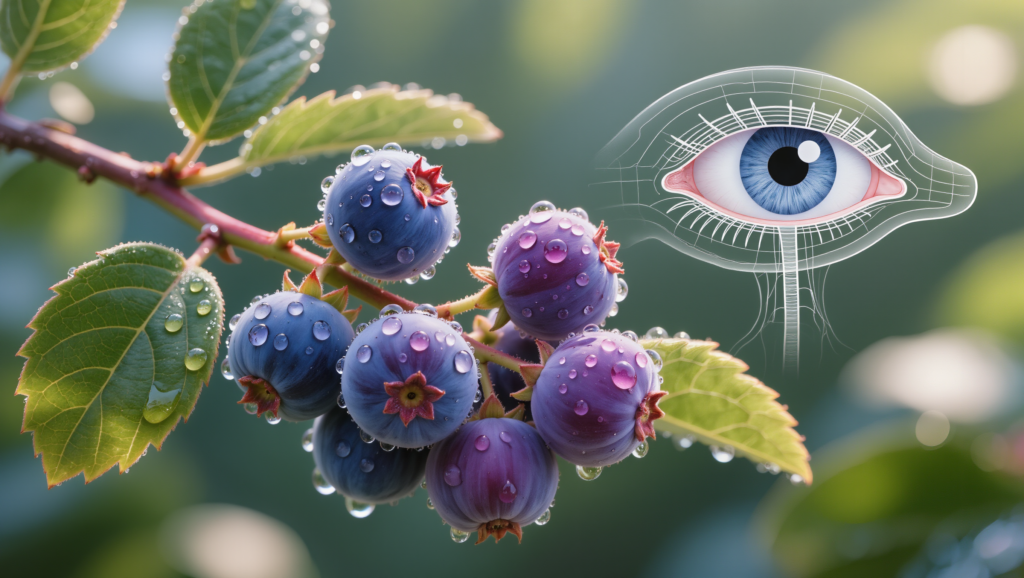Science has increasingly confirmed what herbal traditions and wartime aviation lore have told us for generations: the tiny bilberry (Vaccinium myrtillus) can truly make a positive difference for your eyesight, helping to sharpen vision, protect fragile ocular tissues, and even restore aspects of visual function lost to age, screen strain, or chronic conditions.
What is Bilberry and Why the Hype?
Imagine a cousin of the blueberry—the bilberry—growing wild on heaths and woodlands across Europe, loaded with far more antioxidant power than its farmed relatives. Bilberry’s fame as an eye enhancer reached a peak during WWII, when RAF pilots indulged in bilberry jam, crediting improved night vision and target accuracy to its nutrients. Today, the legend persists—but now there’s actual science to back it up.
Deep Dive: How Bilberry Works for Your Eyes
Research attributes bilberry’s eye benefits to its rich concentration of anthocyanins, vitamin C, and other flavonoids. These compounds do several things:
- Fight oxidative stress in eye tissues, such as the retina and lens.
- Support microcirculation in the tiny blood vessels that supply critical nutrients and oxygen to the eyes.
- Strengthen collagen fibers, which help preserve the structure of blood vessels and the sclera (white of your eye).
- Modulate inflammation tied to eye strain, chronic disease, or age-related decline.
One study observed measurable gains in visual function among people taking 120mg of bilberry anthocyanin extract daily—some saw improvements up to 30% where the placebo group’s vision worsened over two years.
Bilberry vs. Modern Eye Problems
Our modern lives bombard our eyes with blue light, dry air, and relentless visual demands. Office workers plagued by eye fatigue, dryness, and discomfort show significant relief from bilberry supplements; documented benefits include reduced pain, less heaviness, and even improved response to digital screen stress after just a few weeks. In one trial, six weeks of daily anthocyanin-rich bilberry supplementation improved the eyes’ pupillary response, tear stability, and subjective comfort post-computer use compared to placebo.
Retinal and Lens Protection
The retina—your vision’s command center—is especially vulnerable to oxidative damage, inflammation, and poor circulation. Bilberry’s antioxidants shield retinal cells, protecting them from damage associated with aging, diabetes, or inflammatory responses, such as those triggered in experimental models of retinal inflammation. These compounds suppress harmful molecular cascades, stabilize rhodopsin (the photoreceptor protein critical for light detection), and keep oxidative damage at bay—ultimately preserving the ability to see details, react to changes in light, and avoid the hazy decline of night vision.
Notably, research in cataract prevention is compelling: 50 patients with mild cataracts supplemented with bilberry and vitamin E for four months, and a stunning 97% maintained stable cataract progression. This suggests bilberry’s promise not only for existing eye struggle but as a proactive shield against vision loss.
Diabetic Eye Support and Circulation
Diabetic retinopathy—a dangerous breakdown of retinal blood vessels from chronic high blood sugar—is another frontier for bilberry. Its ability to reinforce blood vessel structure and combat inflammation means less leakage, more robust circulation, and a slowing of progression in early disease states. For anyone at risk of vascular eye problems, this berry offers more than antioxidant insurance—it actually nourishes and defends the most sensitive blood vessels in the eye.
Bilberry, Lutein, and Zeaxanthin: Antioxidant Trio
The story gets even better when bilberry is paired with lutein and zeaxanthin, two additional carotenoids renowned for filtering harmful light, protecting the macula, and improving contrast sensitivity. Supplement blends commonly combine all three, multiplying their antioxidant effects and further shielding the retina and lens—especially invaluable for people exposed to bright sunlight or screens day after day.
User Experiences: Real World Improvements
While scientific studies give us the numbers, the most powerful stories come from real people. Reviews frequently highlight restored night vision, relief from dry eyes following surgery, and noticeable improvements in clarity and contrast when driving in low light. Take the case of a Graves disease sufferer whose double vision, light sensitivity, and muscular weakness improved enough with bilberry that daily life became manageable. Many users report their optometrists noting significant visual improvement after sustained bilberry use, with some even “passing” modern eye tests after years of restrictions.
Safety, Dosage, and Considerations
Bilberry is generally safe—a six-week study showed no adverse effects at moderate doses of anthocyanin extract. Optimal research-backed doses fall around 25-120mg of standardized anthocyanins daily, but higher doses have not been extensively studied for long-term safety. Most supplements recommend a simple daily capsule, often taken with breakfast to kickstart visual support for the day’s activities.
Concerns and Counterpoints Of Consuming Bilberry For Eye Health
It’s essential to note that bilberry isn’t a magic bullet. Some studies are limited by small size or lack of long-term follow-up. Results may vary depending on extract standardization, underlying health conditions, and whether supplementation is paired with other nutrients like vitamin E, lutein, and zeaxanthin. There’s also a legitimate need for more in vivo (living human) studies—particularly in the context of genetically diverse participants, longer supplementation periods, and multiple vision endpoints.
So, Should You Add Bilberry to Your Eye Routine?
If your lifestyle involves long hours at screens, frequent night driving, or concerns about hereditary vision loss, adding bilberry—especially alongside other vision-boosting nutrients—has persuasive evidence supporting its use as a safe and effective way to keep your eyes sharp and healthy. The science isn’t all wishful thinking; it’s backed by real clinical trials, positive user reviews, centuries of herbal tradition, and the molecular biology of antioxidants doing real work in living eyes.
Quick Fact Table
| Benefit | Evidence Level | Details/Study Example | |
|---|---|---|---|
| Retina Protection | Strong laboratory, clinical trials | Anthocyanins shield photoreceptors | |
| Dry Eye/Fatigue Relief | Clinical trials, user reports | Office workers in trials, subjective reviews | |
| Night Vision Boost | Wartime lore, user reports, smaller studies | RAF pilots, night driving improvement | |
| Cataract Prevention | Clinical trial | 97% maintained stable lens clarity | |
| Diabetic Retinopathy | Clinical, mechanistic studies | Stronger vessels, less inflammation | |
| Vascular Circulation | Lab/clinical/molecular studies | Collagen reinforcement | |
Practical Tips Of Putting Bilberry to Work
- Choose extracts standardized for high anthocyanin content; European wild bilberry varieties are especially potent.
- Consider combo formulas with lutein and zeaxanthin for synergistic effects—crucial if your concern is macular degeneration or glare sensitivity.
- Take consistently, ideally daily, and allow 4-6 weeks for measurable improvement, as most studies follow at least a month of use.
- Monitor your results—whether through subjective comfort, improved night driving, or even formal eye exams.
The Bottom Line
The scientific verdict is becoming clearer: bilberry is no mere folk remedy or superfood fad. Its antioxidants, anti-inflammatory molecules, and effect on blood vessel health provide real protection, tangible restoration, and genuine sharpening of vision for people in today’s visually demanding world. Backed by the latest research, decades of tradition, and a host of happy users, bilberry truly deserves its reputation as an eye health champion.
So next time you’re pondering better ways to keep reading, driving, or simply enjoying the world’s beauty, don’t overlook this tiny purple berry—the science says your eyes will thank you.
Did you find this article helpful? Support us by following us on our social media for more content on natural health and wellness:: Youtube, Instagram, Facebook, Pinterest, Twitter (X)








